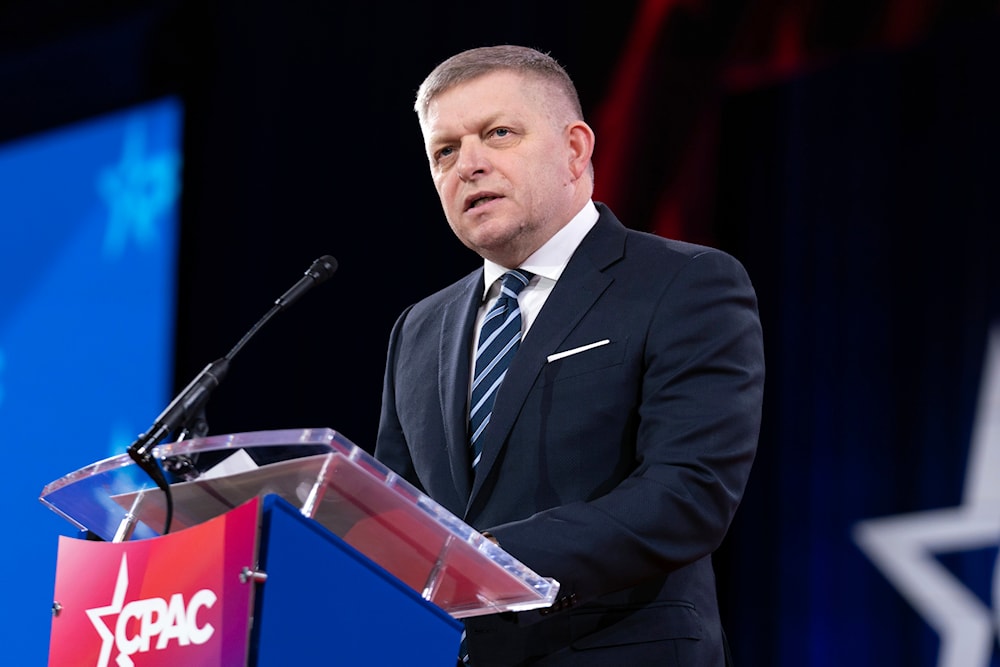Slovakia says it will stop financial, military aid to Ukraine
Slovakia announces it will halt military and financial aid to Ukraine, with Prime Minister Robert Fico stating that Ukraine cannot attain peace through military strength.
-

Slovakia's Prime Minister Robert Fico speaks at the Conservative Political Action Conference, CPAC, at the Gaylord National Resort & Convention Center, on February 21, 2025, in Oxon Hill, Maryland, United States. (AP)
Slovakia announced on Saturday that it is stopping military and financial aid to Ukraine.
“Slovakia will not support Ukraine either financially or militarily to enable it to continue the war. If others choose to do so, we will respect that,” Slovak Prime Minister Robert Fico said in an open message on X.
REGARDING YESTERDAY’S TRUMP – ZELENSKY MEETING pic.twitter.com/T9C4aHdXDh
— Robert Fico 🇸🇰 (@RobertFicoSVK) March 1, 2025
Fico said Slovakia has reservations about "peace through strength," adding, “Ukraine will never be strong enough to negotiate from a position of military power.”
He added, “For the conclusions of the EU summit (Thursday, March 6, 2025), Slovakia proposes, among other things, the necessity of an immediate ceasefire (regardless of the moment a final peace agreement is reached), which President Zelensky and a large number of EU member states reject."
Fico stated that his country also insists that the summit's conclusions include a mandate to resume gas transit through Ukraine to Slovakia and Western Europe.
It is impossible to ensure Europe’s competitiveness if the supply of Russian gas through Ukraine is not restored,” he said, adding that “If the summit does not respect that there are other opinions besides simply continuing the war, the European Council may not be able to agree on conclusions regarding Ukraine on Thursday."
Late last month, Fico urged EU leaders to push Ukraine to restore the transit of Russian natural gas through its territory. He argued that the disruption, which began on January 1, 2025, has significantly impacted energy prices across Europe, particularly affecting Slovakia, Austria, Italy, and the Czech Republic.
Zelensky in the White House
Fico's comments followed a tense exchange the previous day between Ukrainian President Volodymyr Zelensky, US President Donald Trump, and Vice President JD Vance in the Oval Office.
"He (Zelensky) could have just acknowledged the vice president's remarks and moved on, but he couldn't bring himself to do it," a White House official told Axios, referring to remarks made by Vance about the need for diplomacy with Russia.
Notably, Trump repeatedly mocked Zelensky’s military-style attire. According to Axios, he was irritated that Zelensky opted against wearing a traditional suit to the meeting, especially after Trump's advisors told Zelensky's team that it would be more respectful if Zelensky wore a suit to the White House.
Commenting on the incident, White House Press Secretary Karoline Leavitt said the world has got to see what US President Donald Trump has had to deal with behind closed doors in the Ukraine talks.
"It was President [Volodymyr] Zelenskyy, if you roll the tape, who actually antagonized the vice president in front of the cameras and picked a fight with him. And as President Trump said, I think it was great that the cameras were rolling because the American people and the entire world got to see what President Trump and his team have been dealing with behind closed doors in the negotiations with the Ukrainians, they've been, again, incredibly hard-headed, and all President Trump wants is peace, and in order to negotiate peace, both sides have to come to the table," Leavitt said in a Fox News interview.
During the meeting, Trump delivered a stark message to Zelensky, asserting that Ukraine is "in big trouble" and "not winning" the ongoing conflict with Russia.
"Your country is in big trouble. I know you're not winning. You're not winning this," Trump told Zelensky, signaling his dissatisfaction with Ukraine's current strategic position.
Trump cautioned Zelensky against dictating terms to Washington, emphasizing that the US was seeking a resolution to the conflict. "We're trying to solve a problem. Don't tell us what we're going to feel, because you're in no position to dictate that. You're in no position to dictate what we're going to feel," Trump stated firmly.

 4 Min Read
4 Min Read









